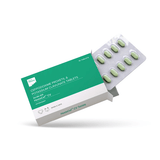Hester Petcare Hestacef CV 162.5mg Tablets
No return & Exchange Available
HestaCef CV is a veterinary antibiotic tablet combining cefpodoxime proxetil (a broad-spectrum cephalosporin) and potassium clavulanate (a beta-lactamase inhibitor) for dogs and cats. This combination may help treat bacterial skin infections, urinary tract infections, and respiratory infections by targeting resistant bacteria. PRESCRIPTION REQUIRED - always use under veterinary supervision.
Dosage Guidelines
Dosage must be determined by your veterinarian based on your pet's weight, condition severity, and infection type. General guidelines include:
- Dogs/Cats: Typically 5-10 mg/kg body weight
- Frequency: Once or twice daily as prescribed
- Duration: Complete full course (usually 7-14 days)
- Administration: Can be given with or without food
Always follow your veterinarian's specific instructions for your pet's individual needs.
Key Contraindications
- Known hypersensitivity to cephalosporin or penicillin antibiotics
- Severe kidney or liver disease (use with caution)
- Pregnant or lactating animals (unless benefits outweigh risks)
- Puppies/kittens under specific age/weight thresholds per veterinary guidance
Common Side Effects
Most pets tolerate this medication well, but may experience:
- Gastrointestinal upset (vomiting, diarrhea)
- Loss of appetite
- Lethargy or mild behavioral changes
Contact your veterinarian immediately if severe reactions occur, including facial swelling, difficulty breathing, or persistent vomiting.
Storage Requirements
- Store at room temperature (below 25°C/77°F)
- Keep in original packaging away from moisture and direct sunlight
- Store out of reach of children and pets
- Do not use after expiration date
Prescription Notice & Disclaimer
VETERINARIAN CONSULTATION REQUIRED - This is a prescription-only medication. This information is for educational purposes only and does not replace professional veterinary advice. Never adjust dosage or discontinue treatment without consulting your veterinarian. Misuse of antibiotics can contribute to bacterial resistance.
Consult your veterinarian for proper diagnosis, dosing, and monitoring specific to your pet's health condition.






